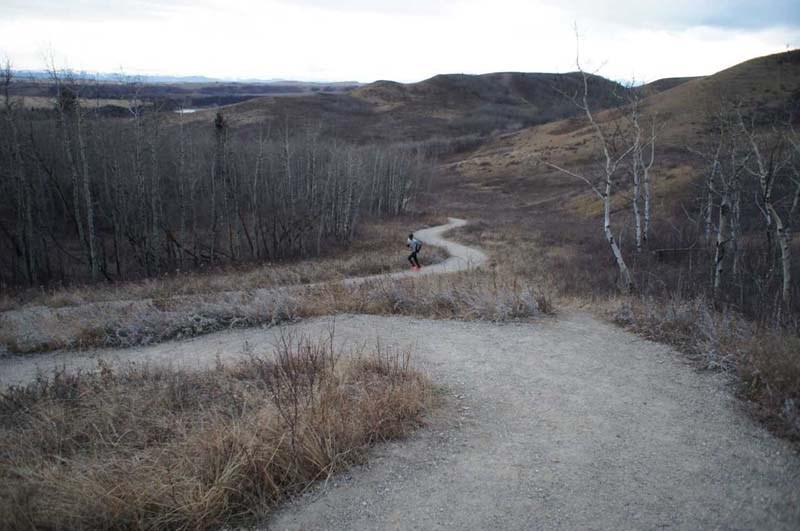More than 20 years ago in a dirt school yard in Kissii, Kenya, a boy, Benard Onsare, and his brother would run laps while the other children watched.
“The kids used to count how many laps with sticks,” Onsare recalled.
Now at age 35, Onsare runs the hills and fields of Cochrane as he makes plans to make the town his permanent home and continue training to qualify for the 2020 Olympics.
Growing up, Onsare had very little and running, for him, was not necessarily a passion to start with, but just a way of life.
Anytime his mother sent him to the market or on errands and every morning and afternoon to and from school – since there was no transportation – he would run. By high school, he became more competitive, racing against other schools and in local races.
Up until he was given his first pair of shoes at age 17, he did this all barefoot.
“There was not much for the family. Running – you don’t have enough food, no shoes, no good clothing, so it was a struggle,” said Onsare, who moved to Canada in 2007.
“I realized that by striving to be active in sports in that way I was getting myself out of trouble,” he said, adding that it kept him from other troubles too, like going to parties. “That kept me busy instead of going with other kids.”
Since moving to Canada, Onsare has competed – and succeeded – in a number of races including the annual Scotiabank Calgary Marathon, which he won in 2013.
But in the last few years, he’s been off the map due to an injury, which he only recently recovered from with the help of his Cochranite coach, Malc Kent.
Onsare also spent the last few years not training due to his injury and was almost to the point of retiring but Kent encouraged him to heal and get back to training.
But since recovering, Onsare now has not only been back training for marathons, but also filled with renewed hope of qualifying for the 2020 Summer Olympics.
“That’s one of my goals before I retire,” he said. “There are a lot of opportunities I’ve got here and I just want to show I really appreciate (it).”
In October, Onsare completed a marathon where he was in the lead for the first half, but he eventually lagged behind due to a lack of training.”
He also ran a half marathon, won by 20 minutes and then went straight to work for a five-hour shift.
“He had no symptoms at all,” Kent said. “So we knew that he had no pain.”
However, Kent said the most important thing was that he was back on the map.
“Canada’s sort of forgotten him, like ‘oh the guy’s injured, he’s never coming back to running,’” Kent said. “So, we just wanted put him back on the map and show people he was coming back.”
One aspect Onsare loves about Cochrane is the hills and the wind – the latter of which reminds him of his home in Kenya.
“Back when I was home, we ran against the wind – it makes you push against the wind and it makes you very strong,” he said.
As he continues to train in Cochrane where his coach lives, he hopes to plant his roots here as well.
“It’s generally pretty common with elite level athletes in running, they will follow the coach,” Kent said, who has known Onsare for the last four years.
“He would have done it already but it’s just the job situation – finding a job in Cochrane that can pay money and is in his line of work,” he said. “The biggest problem for him is he does work to live essentially … because he just needs the money to be able to live and support his family.”
Onsare is planning to participate in Martin Parnell’s Annual Run/Walk on New Year’s Eve in the marathon category.
He said he does it not just for the experience but for the charity aspect. Over the years, Onsare has participated in more than 16 charity races including a charity in which he collected 700 pairs of used shoes to be sent to underprivileged children in Kenya.
“I know, I was there and I never had shoes until I was 17 so I like doing charity and it’s one way to contribute and give back to the community.”



